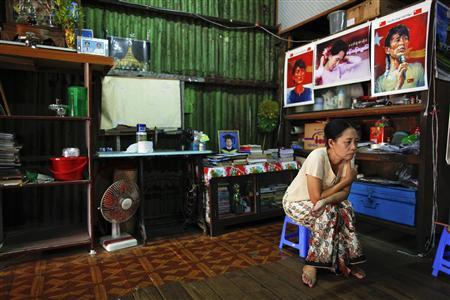(Reuters) – When hundreds of political prisoners were released from Myanmar’s jails in January, supporters greeted them in jubilant scenes. But for Myo Min, a 36-year-old electrical repairman and dissident, the reunion with his wife and children after three years in jail was muted.

That’s because in 2008, after five days of near-continuous torture – with police beating him so savagely their truncheons broke – Myo Min says he provided testimony that put an innocent man behind bars for life. That fellow dissident is still in prison.
“They gave me a document and I signed it,” he told Reuters. “I just couldn’t stand the beatings anymore.”
The document doomed veteran democrat Myint Aye, 61. He is one of 471 political prisoners – including 16 women and 50 Buddhist monks – who remain in jail in appalling conditions, according to the Assistance Association for Political Prisoners Burma, a monitoring group run by Burmese exiles in Thailand. Their plight, Myanmar’s dissidents say, belies the progressive policies of the country’s quasi-civilian government, which embarked on reforms after taking office in March 2011.
Reformist President Thein Sein has relaxed media censorship, started peace talks with ethnic rebels, and held by-elections that put democracy champion Aung San Suu Kyi into Myanmar’s parliament.
Most dramatically, perhaps, more than 650 political prisoners were freed between May 2011 and January 2012, according to Amnesty International. Among those released were celebrated dissidents such as Min Ko Naing and U Gambira, jailed for their role in a 2007 democracy protest led by Buddhist monks.
These reprieves, and the April by-elections that Suu Kyi’s National League for Democracy won by a landslide, helped convince the United States and Europe to suspend economic sanctions against Myanmar earlier this year.
But a Reuters examination shows that Myint Aye and other political prisoners continue to suffer incarceration and abuse in an era of uncertain reform. Their stories hold dangerous implications for Myanmar’s future.
The military junta that ruled the country for nearly 50 years is gone. But it is survived by a formidable apparatus of oppression: corrupt judges, horrific prison conditions, draconian laws still on the books, and police and soldiers who torture with impunity. Until it is dismantled, democracy activists here say, nobody is safe from arbitrary arrest, torture and wrongful imprisonment.
As Myanmar’s long moribund economy opens up, there are signs that repressive system once used to silence political opponents is being retooled for a new era – to sweep away opposition to breakneck economic development. The Thailand-based AAPPB prisoner-monitoring group reports an increase in people being interrogated and jailed for resisting land confiscations and forced evictions, often by the military or businesses with close government connections.
Government officials in Myanmar declined to comment for this article.
MORE RELEASES?
A fresh round of releases could begin in late June, after Suu Kyi’s landmark trip to Europe, predicts Zarganar, an actor and democracy activist who was once imprisoned himself. Any releases will happen slowly, he cautions, with government officials still reluctant to admit political prisoners even exist.
“They call them criminal cases,” Zarganar says. “I tell them, ‘Water is still water, whatever you call it. Please release them. That’s all.'”
Some were jailed after Myanmar’s last spasm of repression in 2007, when police and soldiers crushed the monk-led “Saffron Revolution.” Others were arrested on what Amnesty International says were trumped-up charges of terrorism and convicted in secret courts on flimsy evidence or confessions extracted under torture.
The exact number of political prisoners remaining today is unknown. A list Zarganar submitted to the president’s office in May contains 345 names. AAPPB records 471, and says it is investigating another 466 cases. The confusion is a measure of the secrecy of Myanmar’s gulag.
“One political prisoner is one too many,” said U.S. Secretary of State Hillary Clinton during her historic visit to Myanmar last year.
Asked whether the continued jailing and abuse of dissidents suggests the U.S. eased sanctions too soon, Yangon embassy spokesman Michael Quinlan referred to remarks in April by a senior State Department official, who said Washington’s policy is to “blend both pressure and engagement.” The U.S. continues to press for the release of “at least several hundred prisoners of conscience,” Quinlan added. “In almost every meeting we have with the Burmese government, we engage on the issue of political prisoners.”
Suu Kyi, in accepting the Nobel Peace Prize she won in 1991, said last week the release of famed detainees runs the risk that unknown ones will be forgotten. “Please remember them,” she said, “and do whatever is possible to effect their earliest, unconditional release.”
LIFE IN THE GULAG
Abuses continue under the government that took office in March 2011.
Even now, dissidents are deliberately kept in jails far from their homes, says Bo Kyi, the AAPPB’s joint-secretary. “The idea is to punish not just the prisoners but also their families,” he says. “It’s a type of psychological torture.”
Distant prisons also hamper information-gathering by human-rights groups and make it harder for families to deliver potentially life-saving medicines and food.
In October 2011, 15 dissidents were confined to “cells normally used for prison dogs” after staging a hunger strike in Yangon’s colonial-era Insein Prison, Tomás Ojea Quintana, the United Nations special rapporteur on human rights in Myanmar, reported in March.
The AAPPB has recorded the deaths of 152 detainees since 1998 due to torture and ill-treatment. Two have died during President Thein Sein’s administration, said the Network for Human Rights Documentation Burma (ND-Burma), an advocacy group based in Chiang Mai, Thailand.
The first, Zaw Lin Htun, got a 20-year sentence in 2003 for trying to re-establish a banned student union. He died within weeks of his release last October “due to untreated diseases and being held in sub-human prison conditions that amount to torture,” ND-Burma reported. He was 38.
The second, Thet Nwe, a National League for Democracy member serving a 38-year sentence, had no teeth when he was freed from Insein Prison in January 2012. They had been knocked out during a decade of abuse that his family said had shattered him mentally and physically. He died nine days later, aged 54.
Dozens of gravely ill prisoners remain in custody. Among them is a Yangon engineer named Phyo Wai Aung. He was arrested in 2010 for his alleged role in a series of deadly Yangon bombings, tortured into confessing, then tried in a closed court inside Insein Prison, Amnesty International says.
The abuse persisted despite Myanmar’s transition from military junta to fledgling democracy, his brother Htet says. In February 2011, Phyo Wai Aung was put in Insein’s “dog cells” – kennels built during British colonial times to house guard dogs. The cells were “covered in white lice and smelt like a sewer,” a former detainee told Amnesty. Phyo Wai Aung was there for a month.
His health deteriorating, he spent time in the prison medical ward before being moved recently to a local hospital, where he remains under guard. He was recently diagnosed with liver cancer, his brother says. Last month, he was sentenced to death in the bombings.
The government hasn’t responded to pleas for clemency. “I have sent so many letters to the president’s office. They have all been ignored,” Htet says.
USEFUL LAWS & JUDGES
The task of dismantling the gulag would have to start with reforming draconian laws and the judges who administer them.
Aung Thein, 66, was once a lawyer. In 2008, after representing more than 300 political prisoners, his license was revoked by a high court in Naypyitaw, the capital of Myanmar. Other lawyers who defended perceived enemies of the regime have suffered similar revocations, as well as police intimidation, monitoring and sometimes jail themselves, according to the UN.
Aung Thein has had a client list that reads like a Who’s Who of Myanmar’s democrats, including Suu Kyi herself. The framed dissident Myint Aye, also a client, was the victim of a common tactic in Myanmar’s courts, says Aung Thein. His life sentence was extended by eight years with help from British colonial-era laws such as the Unlawful Association Act, which dates back to 1908 and can add three to five years to a sentence.
A more recent law was passed by the junta to check the influence of the Internet in long-isolated Myanmar. Under the 2004 Electronic Transactions Act, sending a single email deemed detrimental to state security can carry a 15-year jail sentence.
Ko Ko Gyi, a famous political prisoner released in January, was sentenced to 65 years after the 2007 Saffron Revolution. Sixty of those years consisted of four 15-year sentences under the Electronic Transaction Act.
“Most senior judges are notorious fellows, because they only follow government orders,” Aung Thein says.
WAITING FOR MYINT AYE
The imprisonment of Myint Aye is particularly sensitive, human-rights groups say, because he was arrested on the orders of the man who at the time was Myanmar’s police chief – and is now a member of President Thein Sein’s reformist cabinet.
Myint Aye’s story begins at his home in northwest Yangon, a wooden bungalow with rusting tin walls which has long been watched by Special Branch police. “They might be in the teashop at the end of the street,” says his wife, Lae Lae Win. “You can never tell.”
Lae Lae Win, 52, has spent much of her married life waiting for her husband. As a physics student in the 1970s, Myint Aye spent four years in jail for his part in anti-government protests. Later, when he headed a local chapter of her National League for Democracy, Suu Kyi spoke from the steps of his home. Its interior walls are decorated with portraits of the Nobel Peace Prize laureate.
Myint Aye was arrested so many times that Lae Lae Win kept a travel bag with his clothes by the door. Each arrest was followed by up to 18 months in custody. “We never knew where he was taken,” she says. Even in his absence, Special Branch agents monitored the house. “I used to tease my husband, ‘They look after me better than you do.'”
Myint Aye was arrested for the ninth time in August 2008 for his alleged role in the bombing of an office belonging to a junta-backed political organization the previous month.
Repairman Myo Min, a father of four who helped out at NLD events, was arrested two days earlier with two others in connection with the same incident. The abuse began immediately, Myo Min says. Police handcuffed him behind his back, tied a rope around the cuffs and suspended him from the ceiling.
This position can dislocate the shoulders of a heavier man, but Myo Min, a bookish-looking 34-year-old, has a slight build. The pain was excruciating nevertheless. Police beat the soles of his feet and burned his penis with a cigarette lighter, he says. “I felt like I was going mad,” he says.
Such tortures are routinely heaped upon political prisoners, the AAPPB says. It has recorded a range of methods: beatings, stress positions, mock executions, sleep deprivation, solitary confinement, and the “iron road” – rolling a metal rod across the shins until the skin peels off.
Myo Min says he was given no water or food for five days and survived by drinking from a filthy latrine. Battered and sleep-deprived, he signed a police-drafted confession that he had received bomb training from Myint Aye.
Then it was Myint Aye’s turn. He confessed to planning the 2008 bombing after enduring “strenuous interrogation and was forced to watch his colleagues be tortured,” the U.S. State Department said in a 2011 report.
The idea of Myint Aye planting a bomb made no sense to those who knew him. “He is a very simple and honest man,” Zarganar says. “But the government didn’t like him because he promoted human rights.”
Myint Aye’s predicament was made worse by the pressure put on his attorneys. One of his lawyers spent four months in prison for contempt of court. Another fled to Thailand to avoid a similar sentence.
Charging dissidents such as Myint Aye with criminal offenses allows the Myanmar government to deny it holds any political prisoners, says the State Department. “Despite government assertions,” it noted in the report, “a vast majority of these prisoners were not believed to have engaged in any violence.”
STUDENT WARRIORS
In Myint Aye’s case, there was a more likely suspect. An anti-government group called the Vigorous Burmese Student Warriors claimed responsibility for the 2008 bombing in an email reported by Mizzima, a news agency run by Burmese exiles. While this claim was hard to confirm, the Student Warriors had a proven reputation for violence.
In 1999 its members stormed the Myanmar Embassy in Bangkok and held 89 people at gunpoint for more than 24 hours. The hostages included Burmese diplomats and foreign tourists; they were released unharmed after the Thai authorities granted the gunmen safe passage to the Myanmar border. Less than four months later, the Student Warriors and another armed group called God’s Army seized a hospital in the Thai city of Ratchaburi. This time, they were shot dead by Thai commandos.
The Student Warriors’ possible role in the 2008 bombing was apparently ignored. Brigadier General Khin Yi, Myanmar’s police chief at the time, held a pre-trial press conference to announce that Myint Aye had confessed to offering cash awards for “terrorist acts,” reported the New Light of Myanmar, a state-run newspaper.
Khin Yi is now the immigration minister in the reformist government. His office didn’t respond to questions about the Myint Aye case.
Myint Aye and Myo Min were tried in closed courts along with two other co-accused. “I told the judge that I’d been tortured into signing a confession, but he didn’t listen,” says Myo Min. “They didn’t even do a medical.” A doctor would have found the bruises left by his interrogators, he says.
Myo Min was sentenced to eight years in prison. He served most of it in a jail in northwest Myanmar, a location so remote his wife and children couldn’t visit him.
Myint Aye got 28 years. He was transferred to Loikaw Prison, a 24-hour car journey from Yangon in eastern Myanmar. Lae Lae Win visits him once every three months. They are allowed only 20 minutes together. She is now preparing for her next trip.
“I always hope he’ll be released tomorrow, or the day after tomorrow,” Lae Lae Win says. Until then, she will speak to her husband through a metal grille about the life he is missing – their son, for instance, will soon graduate as a civil engineer. A prison officer always sits silently nearby, she says, recording their conversation in his notebook.
(The photo captions have been changed to correct the age of Myo Min)
(Editing by Bill Tarrant and Michael Williams)





